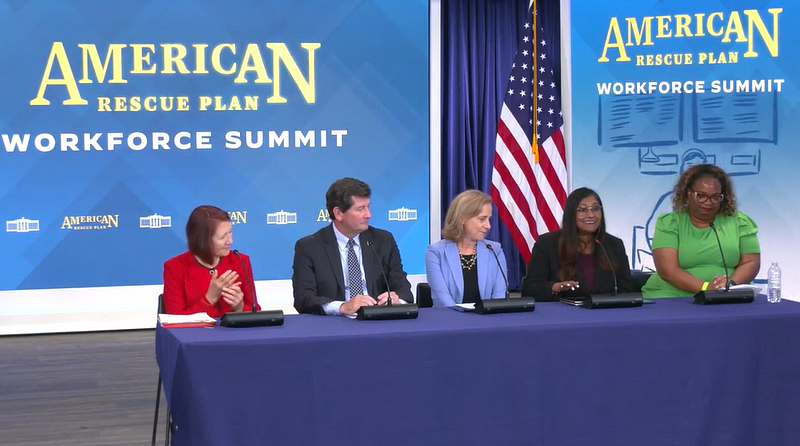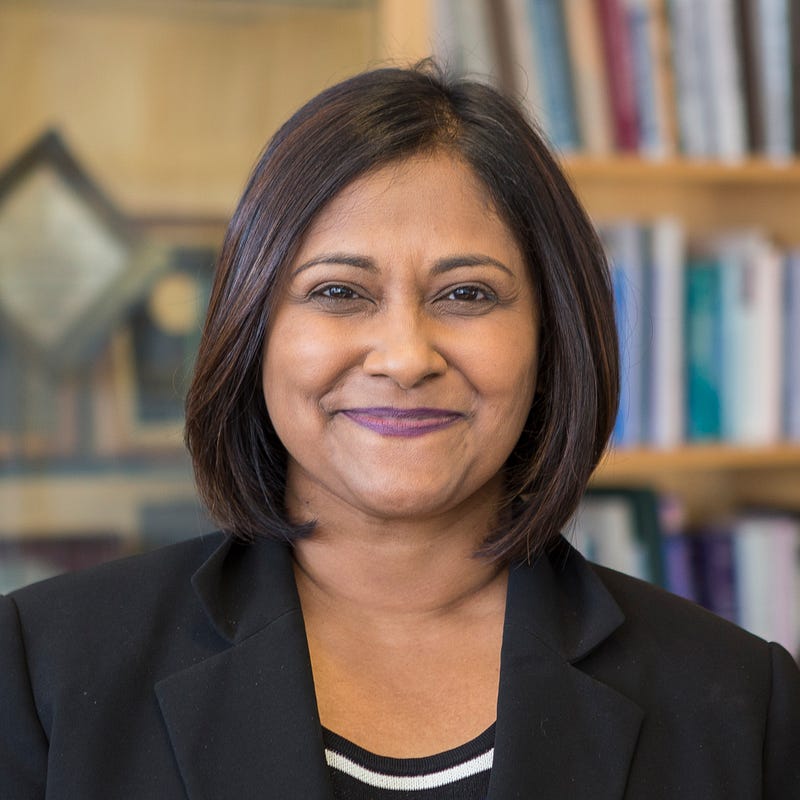To know that we have enough to give, we are enough to share, to live as if we are interconnected and abundant rather than broken or in scarcity. We can choose to live into the nobility of who we and who others are.
Have you ever noticed how often we equate success with more? Whether that’s more products, more profits, more activities or more accomplishments, we buy into the belief that we have to do more to have more to be more. And that will sum up to success. And then along comes The Great Resignation. Where employees are signaling that the “more” that’s being offered — even more pay, more perks, and more PTO — isn’t summing up to success for them. We visited with leaders who are redefining what success means now. Their answers might surprise you.
As a part of this series I had the distinct pleasure of interviewing Somava Saha.
Somava Saha, MD, MS (aka Soma Stout) has dedicated her career to improving health, wellbeing and equity through the development of thriving people, organizations and communities. She has worked as a primary care internist and pediatrician in the safety net and a global public health practitioner for over 20 years. While difficult, she has witnessed and demonstrated sustainable transformation in human and community flourishing around the world.
Currently, Soma serves as Founder and Executive Lead of Well-being and Equity in the World (WE in the World), as well as Executive Lead of the Well Being In the Nation (WIN) Network, which work together to advance inter-generational well-being and equity. Over the last five years, as Vice President at the Institute for Healthcare Improvement, Dr. Saha founded and led the 100 Million Healthier Lives (100MLives) initiative, which brought together 1850+ partners in 30+ countries reaching more than 500 million people to improve health, wellbeing and equity. She and her team at WE in the World continue to advance and scale the frameworks, tools, and outcomes from this initiative as a core implementation partner in 100MLives.
Thank you for making time to visit with us about the topic of our time. Can you please tell us about one or two life experiences that most shaped who you are today?
When I was getting my master’s, I had the chance to travel to the Rupununi Region of Guyana, and I had the privilege of working with the Baha’i Community Health Partnership and 36 indigenous villages. They didn’t believe that the people in this region–at the time the second poorest region in the second poorest country in the Western hemisphere–had nothing to give.
They believed they were noble and had a piece of the puzzle that was needed for the healing of the world. They went about the process of development in a way that they trusted in, built upon and worked to unleash the nobility and contribution of the indigenous people in the Rupununi.
During the next 10 years, I watched as these communities lowered malaria rates by 90 percent, eliminated acquired developmental delay, created an inclusive economy for people with disabilities and transformed the system of education and health to create sustainable transformation in leadership and systems.
I learned from this experience that it was not resources but our approach to communities experiencing inequities that made the biggest difference.
We all have myths and misconceptions about success. What are some myths or misconceptions that you used to believe?
That success came from having the answers or answers getting it perfect or even that one person could be successful. That those experiencing inequities are not successful–versus incredibly resourceful and successful in the context of the structural challenges that trap their potential.
How has your definition of success changed?
I’ve learned that success comes from learning after trying and sometimes failing, from listening and building on the work of many, from knowing that none of us have to have the answers alone.
For me success is when many look at a process and can see that they did it. It is a sustainable and generative change. Above all, it is about trusting in and working to release the trapped and untapped potential of thousands of others across the world.
The pandemic, in many ways, has been a time of collective self-reflection.
What changes do you believe we need to make as a society to access success post pandemic?
- To be systematic about rooting out inequities — we cannot afford for communities to be vulnerable because we are all interconnected. These vulnerabilities come from historic and systemic inequities that have been “untreated.”
- To reject politics of division.
- To lean into our connection with one another as our greatest strength and build a new social contract with one another on that foundation.
What do you see as the unexpected positives in the pandemic? We would love to hear a few of your stories or examples.
Through the pandemic, we were able to demonstrate that we are far stronger together than we ever could be alone. In our work with WE in the World and RISE, we got to witness the power of communities who experience inequities in action — what these trusted messengers were able to do was remarkable.
People took care of one another, reached millions and kept each other safe with food and vaccines, with mental health and economic support. They were creative and stepped forward, when given the opportunity, in ways that kept whole communities safe, working and learning.
We learned about ways of intergenerational healing of trauma from indigenous communities by working with indigenous partners like Oceti Wakan and Freedom Lodge, seed and food sharing among Black minority farmers through Conetoe Family Life, and songs and dances about health and well-being from migrant and Latinx workers through El Sol and Migrant Clinicians’ Network.
We learned of rural communities like Algoma, Wisconsin that visited one another and kept every child learning and every senior connected. We learned that together, we are enough.

We’re all looking for answers about how to be successful now. Could you please share “5 Ways To Redefine Success Now?”
- To unleash the leadership that is latent in communities — in the context of the pandemic, we were able to invite thousands of farmers, barbers, community organizers, migrant workers, Meals on Wheels volunteers and policy leaders to become leaders in health.
- To restore voice, agency and wealth to others, especially those experiencing inequities — see above. The investment of $27 million in the context of RISE in the US, in changing leaders across the world through WE In the World led to hundreds of lives improved, while sustaining those who bring trusted, natural leadership to the work.
- To change the system so that it doesn’t continue to trap the agency and contribution of so many — By changing how funding is structured, for example, so that we don’t rely on a trickle from “trickle down economics” and instead to flood the zone, we demonstrated that those most proximate to the challenges in communities could effectively lead real change.
- To invest in generational change, even if one might never see the fruit of that in one’s lifetime — we need to stop looking for only short term outcomes. We limit our belief about our power and possibility–and our investment in our future–when we do this.
- To know that we have enough to give, we are enough to share, to live as if we are interconnected and abundant rather than broken or in scarcity. We can choose to live into the nobility of who we and who others are.
How would our lives improve if we changed our definition of success?
None of us would feel like we had to change the world alone or feel it was our responsibility to rescue people, just to create the conditions for collective freedom and mutual abundance. We would not need to have all the answers, just be good at asking questions and listening for the answers within community. We would not need to be perfect and certainly not to be saviors–just fellow travelers on a shared journey of mutual healing.
What’s the biggest obstacle that stands in the way of our redefined success? And what advice would you offer about overcoming those obstacles?
An individualistic “hero” model of leadership that sets up people to have the answers and solutions and monetize these for profit. When they inevitably prove to be human, we demonize them.
By shifting to an understanding that all of us have a piece of the puzzle, we can be in a journey of mutual learning and collective abundance together
Where do you go to look for inspiration and information about how to redefine success?
From my child, who teaches me every day
From communities experiencing inequities who are resourceful and creative beyond any of our wildest imaginations
From courageous, humble and wise change leaders around the world who are working to create real change — from Rev. Emma Jordan-Simpson, Richard Joyner and Robert Henderson in the US to the Dalai Lama in Asia to Fr. Lapey in South Africa, to Millicent Otieno in Kenya and Mam-Yassin Sarr in the Gambia to Laina Raveendran-Greene in Singapore
We are very blessed that some of the biggest names in Business, VC funding, Sports, and Entertainment read this column. Is there a person in the world, or in the US, with whom you would love to have a private breakfast or lunch, and why? He, she or they might just see this if we tag them.
Melinda Gates or Mackenzie Scott
How can our readers further follow your work online?
At https://www.weintheworld.org/
@WEintheWorldOrg on Twitter
Thank you for these fantastic insights. We greatly appreciate the time you spent on this. We wish you continued success and good health.


